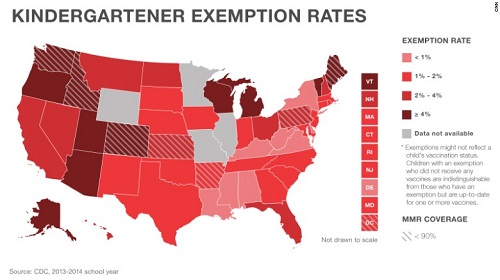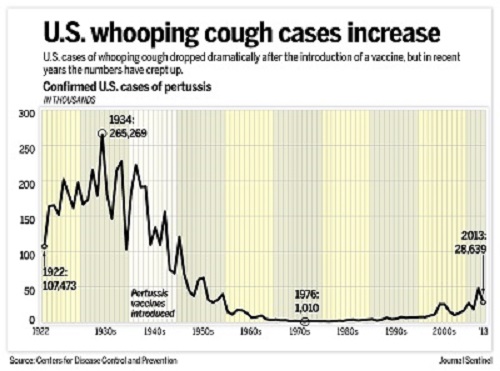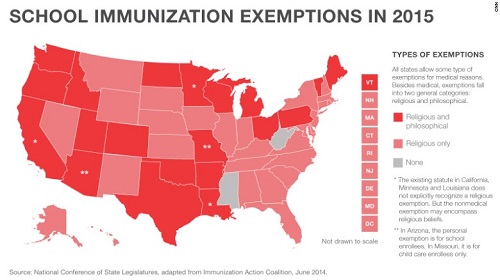Weekly Numbers Report
by Deanna Cantrell
 SPI is asking the U.S. Department of Health & Human services to implement a nationwide vaccination policy.  This would repeal non-medical philosophical and religious exemptions that are currently available in 48 states.  Are there any religious doctrines that are dogmatically opposed to vaccination?  If so, how prevalent are they?
SPI is asking the U.S. Department of Health & Human services to implement a nationwide vaccination policy.  This would repeal non-medical philosophical and religious exemptions that are currently available in 48 states.  Are there any religious doctrines that are dogmatically opposed to vaccination?  If so, how prevalent are they?
A philosophical debate against vaccination can be made by anyone, regardless if that person subscribes to any given theology.┬á Laws exist in order to protect the masses, at times some philosophical freedoms must be sacrificed for, ÔÇ£the greater good.ÔÇØ┬á In this case, that good refers to the concept of herd immunity.┬á In a nutshell, herd immunity is the principle that the greater percentage of a population that is vaccinated, thus immune to a disease; the greater protection the entire population has against that aforementioned disease.┬á For this principle to work, 90-95% of a population must be vaccinated (many experts argue 95%).┬á Considering that each vaccine has its own schedule, this leaves very little room.┬á The CDC reported that the birth rate in 2013 (the last reported year) was approximately 10,800 registered births per day in the U.S.┬á Infants do not receive their first round of multiple vaccines until 2 months of age.┬á This calculates to less than 1% of the population unvaccinated at any given time.
There is a very small percentage of people who medically cannot be vaccinated, this is generally due to an allergy to a component of the vaccine.┬á Regarding vaccines containing weakened components of the disease; administering these vaccines to an immunocompromised person is generally contraindicated.┬á It can lead to infection.┬á This applies to cancer patients receiving chemotherapy, HIV/AIDS patients, patients who have received an organ donation, and even certain types of autoimmune disorders (ex. lupus, ChrohnÔÇÖs disease and rheumatoid arthritis).┬á This is due to the fact that many autoimmune disorders are treated by long-term corticosteroid therapy.┬á A major side effect of corticosteroids is immune suppression.┬á A doctor choosing to not vaccinate a patient because the vaccine will make them ill is that physician practicing the Hippocratic Oath: first, do no harm.
 The final debate against vaccination is religious objection, but just how many mainstream religions actually discourage vaccines?┬á One.┬á The Dutch Reformed Church to be exact.┬á Since the 1800ÔÇÖs, this church has refused vaccines beginning with smallpox.┬á This was mostly due to early observed adverse effects of vaccines from that era…to state the obvious, medicine has since made incredible advances.┬á This was also the era when many women died after childbirth from infection because doctors did not yet wash their hands or wear gloves.
The final debate against vaccination is religious objection, but just how many mainstream religions actually discourage vaccines?┬á One.┬á The Dutch Reformed Church to be exact.┬á Since the 1800ÔÇÖs, this church has refused vaccines beginning with smallpox.┬á This was mostly due to early observed adverse effects of vaccines from that era…to state the obvious, medicine has since made incredible advances.┬á This was also the era when many women died after childbirth from infection because doctors did not yet wash their hands or wear gloves.
 In 2013, a major outbreak of measles hit a Dutch Reformed community in the Netherlands, with 1226 reported cases.┬áOf the 1,226 cases, 176 (14.4%) had complications including encephalitis (1 case), pneumonia (90 cases) and otitis media (66 cases) and 82 (6.7%) were admitted to hospital, which should debunk that belief that measles isnÔÇÖt a serious disease.
In 2013, a major outbreak of measles hit a Dutch Reformed community in the Netherlands, with 1226 reported cases.┬áOf the 1,226 cases, 176 (14.4%) had complications including encephalitis (1 case), pneumonia (90 cases) and otitis media (66 cases) and 82 (6.7%) were admitted to hospital, which should debunk that belief that measles isnÔÇÖt a serious disease.
It should be noted that some religions that normally shun modern medicine embrace vaccines for the sake of the community.┬á For example, JehovahÔÇÖs Witnesses refuse blood products even if it means their untimely demise.┬á However, since 1978 vaccines and even immunoglobulins to treat hemophilia have been acceptable.┬á A contemporary Watchtower web even page acknowledges the efficacy of vaccination in preventing hepatitis A and hepatitis B.
Christian Scientists who are known for choosing prayer over modern medicine even allow vaccinations in their church.┬á ┬áIndividual believers often forego immunization, and church members have lobbied governments for religious exemptions from immunization.┬á However, the founder of the church Mary Baker Eddy said during a 1901 interview, : ÔÇ£Rather than quarrel over vaccination, I recommend, if the law demand, that an individual submit to this process, that he obey the law, and then appeal to the gospel to save him from bad physical results.ÔÇØ┬á Therefore, the church itself has no dogmatic opposition to vaccination.
The Amish are known to shun modern society, but they, too, have no objection related to vaccines in their doctrine.  Disease in the Amish community is measured by an inability to work, rather than symptoms.  Low immunization rates in Amish communities have been attributed variously to limited access to care, limited disease understanding, higher priority to other activities, and concerns about vaccine safety, with variability among various communities.
The Jewish community have a practice of placing the need of community over the needs of the individual.┬á As such, they do not subject vaccines (even insulin) to kosher standards.┬á Some vaccines contain animal products which in any other way would be disallowed for consumption due to Jewish law.┬á ┬áIt is based on the┬áÔÇ£law of necessityÔÇØ in Islamic jurisprudence: ÔÇ£That which is necessary makes the forbidden permissibleÔÇØ in exceptional circumstances. Numerous Islamic authorities and medical scholars agree that many immunizations are obligatory, when the disease risk is high, far outweighing any risk from the vaccine. As opposed to many churches, Islam seems to endorse vaccines rather than just not be opposed to them.
 Regarding the broad spectrum of Christian religions, none in the study expressed any dogmatic law against vaccination.  Roman Catholicism, Eastern Orthodox and Oriental Orthodox Churches, Amish, Anglican, Baptist, the Church of Jesus Christ of Latter-day Saints (LDS), Congregational, Episcopalian, Lutheran, Methodist (including African Methodist Episcopal), Pentecostal, Presbyterian, and Seventh-Day Adventist Church. Roman Catholics and some other denominations have expressed concerns about the aborted fetal tissues used in manufacturing some vaccines, although this concern has never included a formal restriction, by doctrine, of vaccination.
Regarding the broad spectrum of Christian religions, none in the study expressed any dogmatic law against vaccination.  Roman Catholicism, Eastern Orthodox and Oriental Orthodox Churches, Amish, Anglican, Baptist, the Church of Jesus Christ of Latter-day Saints (LDS), Congregational, Episcopalian, Lutheran, Methodist (including African Methodist Episcopal), Pentecostal, Presbyterian, and Seventh-Day Adventist Church. Roman Catholics and some other denominations have expressed concerns about the aborted fetal tissues used in manufacturing some vaccines, although this concern has never included a formal restriction, by doctrine, of vaccination.
It should be noted that fetal tissue that aborted fetal tissue is used in the manufacture of some Rubella vaccines.  The MRC-5 cell line was developed in September 1966 from lung tissue taken from a 14 week fetus aborted for psychiatric reasons from a 27 year old physically healthy woman. MRC-5 is a known source of human DNA in vaccines.  Today, these proteins are genetically engineered by yeast.  This means that the fetal tissue debate is now outdated.  For further reading into this subject, it is encouraged to read the article Vaccines DO NOT Contain Fetal Tissue by Dr. Jay L. Wile who interestingly enough is a Christian.
Buddhists, Hindus and Janists also have no dogmatic objection with vaccination.  These three groups revolve around a common theme of doing what is necessary for life as well as valuing life.  That is, after all, how societies thrive: by doing what is necessary to preserve life for all, even if it means sacrificing certain deeply held beliefs.  It is our instinct to survive.  Vaccines have made this quest much more attainable.
*For further reading on prevalence of U.S. school vaccine exemptions, by state, please visit the CDC’s website.
